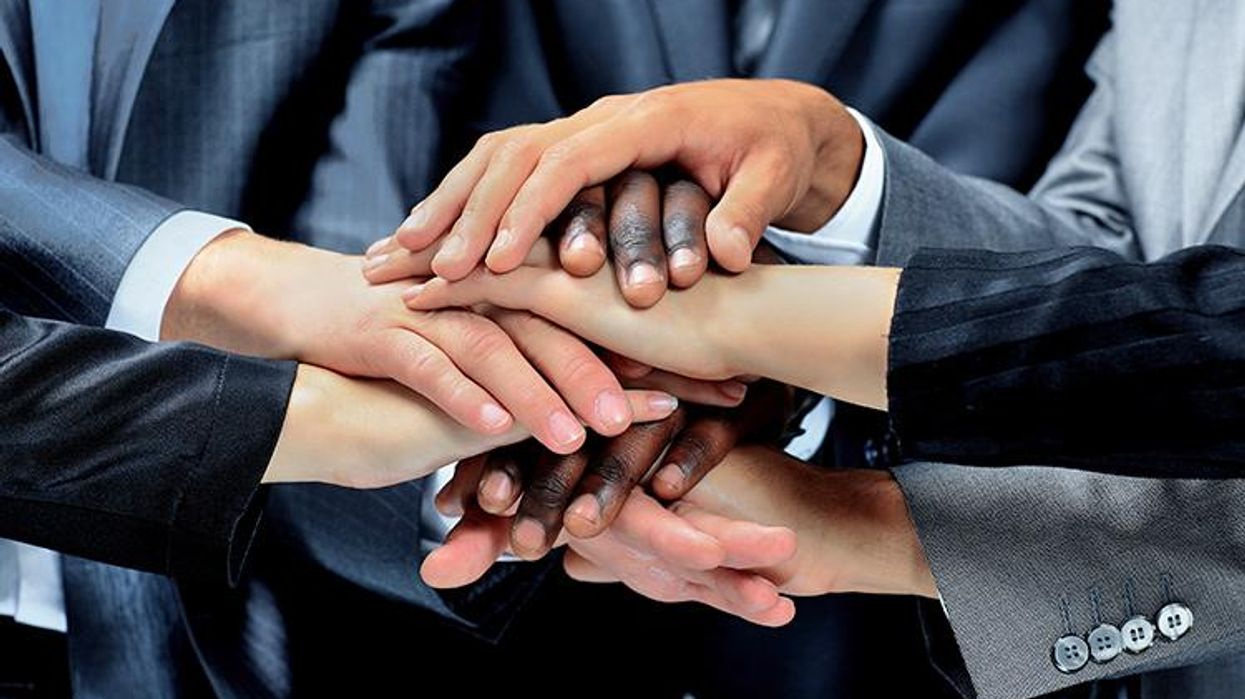Voices
The U.N. Wants American Businesses to End Anti-LGBT Discrimination

In lieu of our government banning workplace discrimination, the United Nations recently offered some suggestions for companies to take the lead.
October 16 2017 1:45 AM EST
By continuing to use our site, you agree to our Privacy Policy and Terms of Use.

In lieu of our government banning workplace discrimination, the United Nations recently offered some suggestions for companies to take the lead.
Surprise! Being nice to people makes them happier. Double surprise! Being inclusive and encouraging of a diverse workplace makes employees more productive.
These are, of course, empirically established facts, so it's sad that in 2017, in the United States, they even need to be stated. The debate about diversity and inclusion in the workplace should long have been relegated to history books, rather like marching against Nazis. But, of course, the increased normalization of racism and bigotry -- especially on a global level -- calls on us to restate the case for diversity in the workplace. I was reminded of this while engaging with the United Nations recently, as it launched new standards aimed at businesses to tackle discrimination against LGBTI people.
The UN's action is not just aspirational, it is unfortunately defensive -- designed to protect LGBTI workers, suppliers, distributors and consumers in the U.S. and abroad, in large and small companies alike, that still face discrimination based on how they identify. Workers like Jameka Evans, a former security guard at Georgia Regional Hospital in Savannah, who was harassed, denied equal pay, and then forced from her job because she was a lesbian. The U.S. Supreme Court may now hear her case, potentially establishing federal employment protections on sexual orientation. Evans's case -- from hate to hope -- is all the more remarkable in highlighting the very absurdity of the fact that discrimination is still legal.
On a global scale, the UN's standards are meant to serve as a guide for businesses across the world in their efforts to breakdown LGBTI discrimination in their workplace, marketplace, and community. By outlining five key elements, the office provides companies with a framework by which they can assess their overall efforts and progress; progress we know is actually good for the bottom line.
The Business Case
Good CEOs, boards and shareholders shouldn't need convincing to adopt such basic standards. Simply put, being accepting is proven to be good for business. We know that by returning to the logical basics. Empirical research.
In a diverse workplace: viewpoints are challenged, creativity is boosted, and better ideas are formed. McKinsey research shows that diverse companies are 15 percent more likely to outperform the rest. Sylvia Ann Hewlett, Melinda Marshall, and Laura Sherbin's research for Harvard Business Review shows that employees at more diverse companies are 45 percent more likely to report that their firm's market share grew over the previous year and 70 percent more likely to report that the firm captured a new market.
These are bold correlations that are also highly intuitive. As are the reverse effect; discrimination is likely to come at a high cost to staff productivity and loyalty. The Center for Talent innovation shows that LGBTI individuals who feel both isolated in their workplace and pressured to keep their sexual identity under wraps are 73 percent more likely than their colleagues to leave a company within three years. Another study of LGBTI policies in the U.S. shows that employees at companies with supportive policies are significantly more committed to their employers and are more productive.
Role Modeling
What does this mean in practice? For me, the research is important. But common sense is king and the criteria for the Human Rights Campaign Corporate Equality Index is a good guide. Start with totally equal hiring, benefits, structures. Those parts are important, though not always easy. Where I see even established and seemingly equal businesses fall down is in competency training of their leaders and employees, particularly around transgender issues.
Powering Forward
So, while it's sad that the UN even has to codify these standards, it's vital that we pay attention, evangelize and adopt them. For us in the United States, it is up to businesses and civil society to lead. The economic benefits are clear, the moral obligation concrete.

Charlie Kirk DID say stoning gay people was the 'perfect law' — and these other heinous quotes